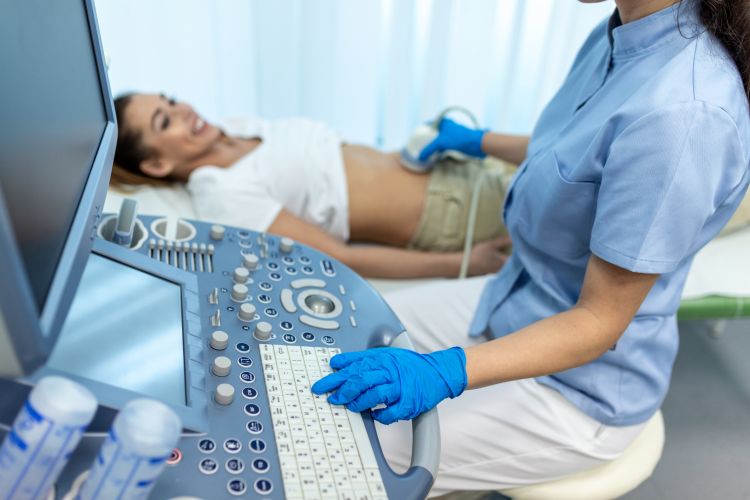Leeds academic’s research informs independent pregnancy loss review

University of Leeds research into how expectant parents receive unexpected news during pregnancy ultrasound scans has informed a government-commissioned review into early pregnancy loss.
Dr Judith Johnson, Associate Professor of Psychology in Leeds’s School of Psychology, contributed to the Independent Pregnancy Loss review in July, which was commissioned by the UK Government’s Department of Health and Social Care (DHSC).
The review made 73 recommendations for improving care and support available to families when baby loss occurs before 24 weeks’ gestation, including advice on how to support sonographers in the best ways to share unexpected news with parents-to-be.
One recommendation, which is based on Dr Johnson’s research, states that all sonographers should be trained in how to communicate before they qualify.
It highlights the negative impact of a ‘warning shot’ which is often used when communicating news in other healthcare settings. It states that Dr Johnson’s research, ‘found that this warning shot is often not wanted in an ultrasound setting as parents have already received their warning shot from the sonographer’s body language and facial expression’.
The recommendation states all sonographers should communicate in line with the consensus guidelines created in Dr Johnson’s work: “All sonographers who may need to break unexpected bad news to parents should be required to undertake training on Consensus guidelines on the communication of unexpected news via ultrasound and/or other courses to develop their skills.”
An emphasis on the neutrality of language used by sonographers when communicating with parents was also highlighted in the findings. Words like ‘abnormal’ should be avoided in the context of sharing difficult news to reduce parental anxiety and distress. Dr Johnson also highlights the importance of healthcare professional honesty and the naming of emotions when parents are upset or in distress i.e. ‘We recognise this is difficult news to hear’.
The review proposed that this should be incorporated into all sonography training curricula.
The recommendation was based on the Consensus Guidelines on the Communication of Unexpected News via Ultrasound, a research project led by Dr Johnson. The guidelines have been adopted by the British Medical Ultrasound Society (BMUS) and the Society and College of Radiographers (SCoR) in their guidelines for professional practice.
Devastating experience
There are 250,000 miscarriages every year in the UK, and for many expectant parents, this can be a devastating experience.
The review states that early pregnancy loss is often labelled as a ‘clinical episode’ with healthcare professionals not considering the individuals’ emotional and physical wellbeing.
As a result of the review, the government has implemented new and short-term changes, 20 of which have been brought in immediately.
The government’s response to the review states that it will ‘Continue to update on our work, including on the remaining medium and long-term recommendations’.
These guidelines acknowledge sonographers' important role for the first time, recommending that they should be trained in our communication guidelines and supported with this aspect of their job.
Upcoming changes
Dr Johnson said: "We welcome the findings of this review, which recognise the crucial role that sonographers play in supporting expectant parents when they are experiencing a pregnancy or baby loss. Sonographers have to be expert communicators – expectant parents watch their face as they conduct the scan.
“Sonographers have no time to figure out what they’ll say before they communicate news which be potentially devastating. These guidelines acknowledge their important role for the first time, recommending that all sonographers should be trained in our communication guidelines and supported with this aspect of their job.
Other recommendations include introducing a voluntary certificate for parents who lose their baby before 24 weeks, and developing and creating "a bespoke holder" to allow remains to be collected and stored with due dignity. In the past, women have been told to retrieve baby-loss remains from toilets and store them in home fridges.
Since the review, Dr Johnson has conducted the first pilot evaluation of an intervention designed to train sonographers how to communicate unexpected news in keeping with the guidelines. The promising results are currently under peer review.




